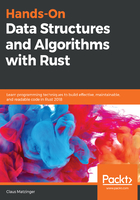
Deeper into Rust
Another one of Rust's strong points is its thriving community. Many users actively participate in their local community (by going to or organizing meetups) or online via working groups, the IRC/Discord channel, or the official forum. The most important online resources are as follows:
- The main website with pointers to various resources: https://www.rust-lang.org
- The Rust user forum: https://users.rust-lang.org
- The official Twitter account: https://twitter.com/rustlang
- A collection of IRC channels at https://wiki.mozilla.org/Rust
- Rust's official blog: https://blog.rust-lang.org
- The Rust Book: https://doc.rust-lang.org/book/
Other than that, users have created additional content, such as podcasts, blogs, and various tools and libraries. The most impressive user contributions, however, can be found in the core language!
Rust's official GitHub repository at https://github.com/rust-lang holds the source code for many of the resources (for example, the website, blog, book, and documentation), and contributions are very welcome.
Mozilla has an impressive record of creating and fostering open source communities, and Rust is no different. As active members of these communities, we encourage everyone to take part and help make Rust the most enjoyable and useful language around!